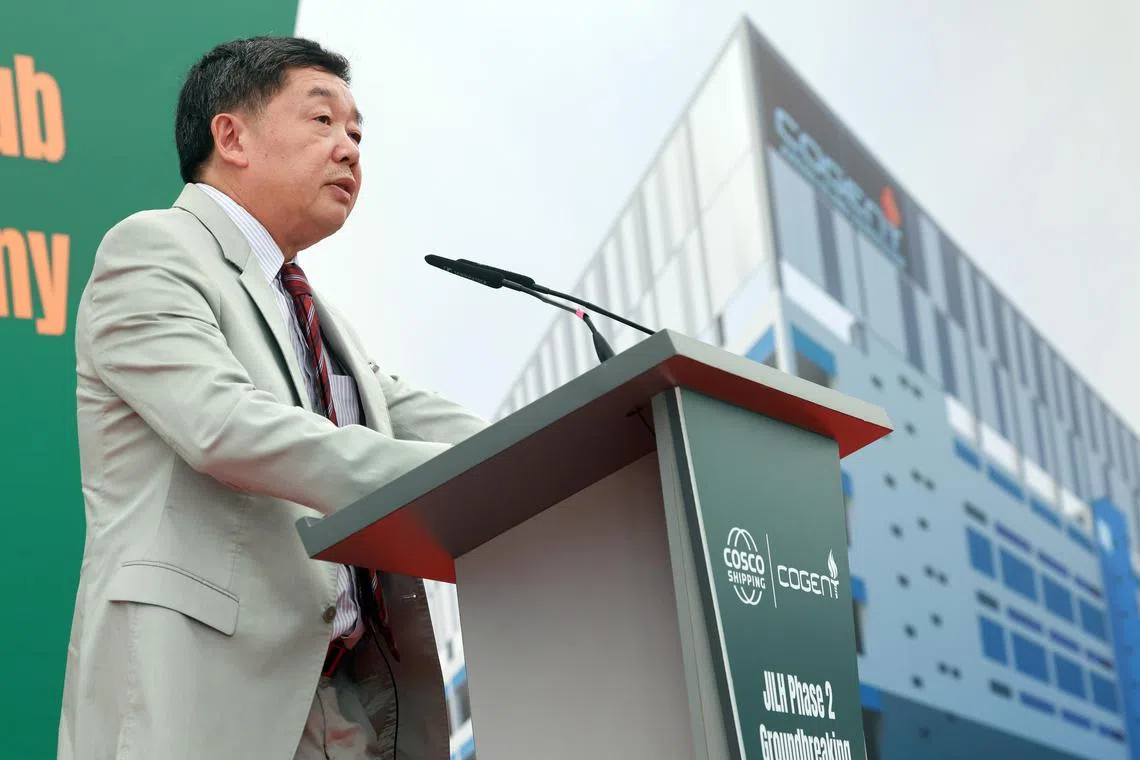Cosco Shipping doubles Jurong Island logistics hub capacity to meet rising demand
Sign up now: Get ST's newsletters delivered to your inbox

Mr Lan Chun Hai, executive vice-president of Cosco Shipping, at the groundbreaking ceremony for the second phase of development of the Jurong Island Logistics Hub.
PHOTO: LIANHE ZAOBAO
SINGAPORE - The movement of cargo between Singapore’s mainland ports and the Jurong Island petrochemical hub is set to become more efficient and sustainable, with fewer trucks and more barges making the trips even as the storage capacity on the island is being doubled to meet rising demand.
The move to improve how cargo is moved was announced on Dec 17, during a groundbreaking ceremony for the second phase of development of the Jurong Island Logistics Hub (JILH).
Development work will be carried out by Cogent Holdings, a wholly owned subsidiary of Singapore Exchange-listed shipping and logistics firm Cosco Shipping International (Singapore). It will involve an additional 2.5ha of land with approximately 62,500 sq m of built-up area.
The expansion will double the capacity at the existing JILH facility, which currently handles about 100,000 twenty-foot containers annually and has maintained over 90 per cent warehouse occupancy since becoming operational in April 2021, said Cosco Shipping’s executive vice-president Lan Chun Hai.
The second phase of expansion will involve an investment of around $142 million. The funds will be raised in a $273 million rights issue currently in progress by Cosco Shipping, announced in August. The development will be complete in 2026.
The move comes after port operator PSA Singapore announced in March the expansion of its Jurong Island Terminal (JIT) to meet rising demand for efficient and sustainable logistics from companies based on the island.
To reduce the use of trucks and lessen the impact of a shortage of truck drivers, JIT now enables the transport of containers by barges between Jurong Island and PSA’s main terminals at Tuas, Pasir Panjang and Brani. Sailings take place twice a day.
While raw materials and finished products in containers can be trucked to and from Jurong Island by road, barging is less labour-intensive, does not contribute to road congestion and generates about 30 per cent less carbon emission.
Demand for barging has grown steadily in recent years, with JIT volumes recording year-on-year growth of 13 per cent in 2023 to reach 149,000 twenty-foot containers. Due to its proximity to JIT, JILH handles over 67 per cent of the containers arriving at Jurong Island by barges.
In partnership with JTC Corporation, which manages Jurong Island, PSA is now increasing JIT’s annual handling capacity to 300,000 twenty-foot containers by 2025.
Demand is rising from global companies carrying out refining, olefins production and chemical manufacturing operations on Jurong Island, including the likes of Shell, Exxon Mobil, Sumitomo Chemical Asia and Asahi Kasei.
Singapore’s petrochemical hub has attracted over $50 billion in investments to date. The sector plays a key role in providing raw materials and products used in consumers’ daily lives, ranging from personal and healthcare to electronics, automotive and solar panels, among others.
The sector contributes around 3 per cent to the Republic’s gross domestic product and 20 per cent of total manufacturing output.
Cosco Shipping International (Singapore) shares closed 0.1 cent higher at 14 cents on Dec 17.
Correction note: The story has been amended for clarity.


